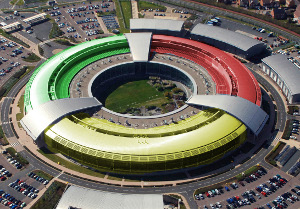Using the Paris attacks as an excuse, governments around the world are clamping down on free speech, and the tools that make that speech possible in the digital age.
Cameron, who clearly read somewhere that it doesn’t matter what you say, so long as you sound decisive, has declared war on cryptography.
I talk a bit about this in a rant I recorded earlier:
A secure internet secures us all, and despite having never so much as got a parking ticket, I feel deeply uncomfortable in the UK – which is officially the most spied on country in the “free” world. Where every car journey is tracked, where people are recorded (both audio and video) in virtually every public space, where every text message, email, phone conversation and website is recorded and analysed.
Where, if Cameron has his way, it will soon be a crime to use tools to resist this ever watchful eye.
Not knowing if you’re being watched, and not knowing what conclusion some faceless spook or bureaucrat will make from the activity of your day to day life is stressful and socially damaging. People will always say “if you’ve nothing to hide, you’ve nothing to fear”, but really it’s all about context.
Granted, there are crazies out there, but the gunmen in the Paris attack were known, and they communicated openly with each other. Why weren’t they picked up? Well, the French already stated, that it is simple not possible to investigate every possible lead – so throwing the net wider and making the haystack bigger, while sounding good in an election campaign, can only make it less likely that you’ll spot the next attack.
Destroying freedom in order to protect it is not winning, Mr Cameron. We lived for decades under the threat of Christian terrorists, and the threat of US/USSR nuclear annihilation, without shredding the constitution.
Putting the whole country under surveillance in a modern reboot of East Germany is not going to protect us. Destroying the UK’s IT sector is not going protect us either.
Christian Payne and Cory Doctorow say this much much better that I did.
A #SnoopersCharter rant https://t.co/86r6MCmDdu where I read some of what @Doctorow wrote here: http://t.co/Y2atsYZzVG
— Christian Payne (@Documentally) January 13, 2015
Perhaps trying to get to the reasons why so many poor people are angry and turning to religious fanaticism and violence might be a better idea?
But of course you won’t. You need to appear Tough. You need to Lead. To support your backers.
The Cheltenham eye of Sauron is being turned inwards, not to protect UK citizens from terrorists, but to protect the interests of your super rich friends from the dispossessed and increasingly angry poor, as you strip away their freedoms, education, healthcare, houses and livelihoods.
My blood is boiling again, so I think it’s time to sign off and go drink some herbal tea.
I’ll leave you with a video by Russell Brand. No matter what your personal views are on this guy, his video on the Charlie Hebdo massacre hits the nail absolutely on the head.
Peace.



 Ok, so here’s an experimental, proof of concept plugin for Idno that provides OpenPGP encryption for form posts between web clients and the server (just in time for
Ok, so here’s an experimental, proof of concept plugin for Idno that provides OpenPGP encryption for form posts between web clients and the server (just in time for